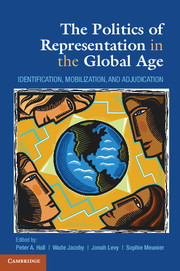Book contents
- Frontmatter
- Dedication
- Contents
- Abbreviations
- Acknowledgments
- Foreword
- 1 Introduction
- Part I The Politics of Interest Representation
- 2 Discursive Democracy and the Construction of Interests
- 3 Regulation Released
- Part II Responding to the Challenges of a Global Era
- Part III New Institutional Settings for Representation
- Short Biographies of Editors and Contributors
- Index
- References
3 - Regulation Released
The Politics of Consumer Protection in Postwar France
Published online by Cambridge University Press: 05 June 2014
- Frontmatter
- Dedication
- Contents
- Abbreviations
- Acknowledgments
- Foreword
- 1 Introduction
- Part I The Politics of Interest Representation
- 2 Discursive Democracy and the Construction of Interests
- 3 Regulation Released
- Part II Responding to the Challenges of a Global Era
- Part III New Institutional Settings for Representation
- Short Biographies of Editors and Contributors
- Index
- References
Summary
Between roughly 1975 and 1984, French consumer and producer groups met more than one hundred times in a range of venues and subgroupings to negotiate a set of agreements that would address the growing concerns of French consumers. Borrowing ideas from Ralph Nader's movement in the United States, and from countries like Sweden and Britain that already had established consumer protections, French consumer groups attempted to negotiate their own domestic consumer protection regime directly with industry. The negotiations they conducted ran the full gamut of consumer grievances, including product pricing and inflation, informative labels, misleading advertising, product quality and safety, legal terms covering sales to consumers, dispute resolution, doorstep sales, and product liability. By the mid-1980s, most of these negotiations had failed, and the French state stepped into the regulatory gap. Legislators created powerful new regulatory agencies that imported an American-style consumer protection regime into the heart of French markets. In a society that had been famously producer oriented, consumers emerged as a new focus of public policy.
The rise of consumer protections across the advanced industrialized countries during the 1970s and 1980s poses an acute challenge to dominant theories of interest representation that emphasize the weight of industry. Most influential among these were the capture theories proposed by Mancur Olson (1965) in The Logic of Collective Action, and elaborated by George Stigler (1971), Sam Pelzman (1976), Russell Hardin (1982), and many others. In these approaches, large societal groups face obstacles to coordination that place them at a disadvantage relative to concentrated interests when pursuing their goals in public policy. Such organization-focused interest group theories were deeply influential in the fields of politics, economics, and public policy. Yet they emerged during a period in the late 1960s and 1970s when diffuse interests, including environmentalists, women, retirees, and consumers were proving highly effective at mobilizing and influencing public policy. Of these groups, consumers – the diffuse interest par excellence – posed perhaps the greatest empirical challenge.
- Type
- Chapter
- Information
- The Politics of Representation in the Global AgeIdentification, Mobilization, and Adjudication, pp. 53 - 72Publisher: Cambridge University PressPrint publication year: 2014



